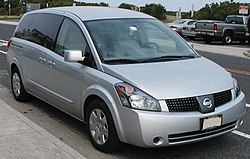| Nissan Quest | |
|---|---|
 | |
| Manufacturer | Nissan (2004-present) Ford Motor Company (1993-2002) |
| Production | 1993-present |
| Predecessor | Nissan Axxess Nissan Van C22 (Vanette) |
| Class | Minivan |
| Layout | FF layout |
The Nissan Quest is a minivan produced by Nissan since 1993. There have been three generations of this model. The first generation Quest was a collaboration with Ford, which produced the mechanically identical and cosmetically similar Mercury Villager. The vans debuted at the 1992 North American International Auto Show in Detroit. Today, its top competiters are the Honda Odyssey, Dodge Grand Caravan, Chrysler Town & Country, and Toyota Sienna
The Quest is distinguishable by a grille and headlights that are slightly shorter top to bottom than those on the Villager. Both vehicles were initially powered by the 3.0 L Nissan VG30E V6 until 1999, when the Quest received the 3.3 L version of the same engine. The Quest was completely redesigned for 2004. The current model is built on the FF-L platform, which it shares with the Altima, Maxima, and Murano. It also shares the award-winning 3.5 L VQ engine with those cars.
First generation (1993-1998)
| First generation | |
|---|---|
 | |
| Production | 1993–1998 |
| Assembly | Avon Lake, Ohio |
| Body style(s) | 3-door minivan |
| Engine(s) | 3.0 L VG30E V6 |
| Transmission(s) | 4-speed automatic |
| Wheelbase | 112.2 in (2850 mm) |
| Length | 189.9 in (4823 mm) |
| Width | 73.7 in (1872 mm) |
| Height | 67.5 in (1715 mm) (Cargo) 65.6 in (1666 mm) (1993-95 XE) 68 in (1727 mm) (GXE & 1996-98 XE) |
| Fuel capacity | 20.0 US gal |
| Related | Mercury Villager Nissan Maxima |
The Nissan Quest was a new model made by Nissan to compete in the minivan segment. The Quest was a successor to the Axxess, which was sold in the United States in 1990 only and in Canada from 1990-1995. It also replaced the rear-wheel drive Vanette, also discontinued in 1990. The Quest was initially powered by Nissan's 3.0 L VG30E SOHC engine that made 151 hp (the engine is a slightly modified version of that found in other Nissan vehicles; one of the requirements of Ford was it be modified to become a non-interference engine, thus if the timing belt breaks, there would be no damage to the valves). The Quest was available as GXE or XE models. Because of manufacturing issues, Nissan had an arrangement for Ford to assemble the minivan in North America, and in turn they were allowed to rebadge it and sell it under the Mercury brand as the Mercury Villager. Many of the interior parts, including the radio, heater controls and power windows controls were adapted from Ford, and were similar to the Ford Aerostar. This generation of the Quest minivan was built in Avon Lake, Ohio, where the Villager was also built. The van shares a modified version of the VG30E from the U11, and early J30 Maximas, as well as the transmission from the Maxima.
An initial complaint was the sometimes annoying motorized shoulder seatbelts. Seating was for 7, with a removable 2-seater bench in the middle, allowing the third row bench of 3 seats to slide up (either folded up for more room or down for passengers) behind the front for more rear cargo room. 1996 saw the introduction of changes to the front and rear fascias, as well as headlights and taillamps.
Second generation (1999-2002)
| Second generation | |
|---|---|
 | |
| Production | 1999–2002 |
| Assembly | Avon Lake, Ohio |
| Body style(s) | 4-door minivan |
| Engine(s) | 3.3 L VG33E V6 |
| Transmission(s) | 4-speed automatic |
| Wheelbase | 112.2 in (2850 mm) |
| Length | 194.6 in (4943 mm) (2001-02) 194.8 in (4948 mm) (1999-2000) |
| Width | 74.9 in (1902 mm) |
| Height | 64.2 in (1631 mm) 67.3 in (1709 mm) |
| Fuel capacity | 20.0 US gal |
| Related | Mercury Villager Nissan Maxima |
For 1999, the Quest got a facelift that gave the exterior a more aerodynamic look, and the driver's side sliding door. The Quest also got a power boost via the 3.3 L VG33E SOHC engine, making 170 hp (127 kW) and 200 ft·lbf (270 N·m) of torque. The XE trim was discontinued and the GXE was moved as the base model. Two new trim levels were also introduced: the top of the line GLE and the sport model SE.
Nissan imbued the 2001 Quest with a raft of minor improvements. Styling front and rear was updated, along with new alloy wheels on all models. The entry-level GXE gained a rear stabilizer bar, while the sporty SE received acceleration-sensitive strut valving and a strut tower brace. New interior gauges and fabrics as well as a 130-watt sound system were standard on SE and GLE. Luxury GLE models also received an in-dash six-CD changer and a wood and leather-trimmed steering wheel. An optional overhead family entertainment system replaced the former floor-mounted model, though it could still be specified for SEs and GLEs equipped with a sunroof. Front seatbelts were given pretensioners. The 2001 Quest was also slightly longer, with more cargo space than the previous generation.
By the end of this generation, both Honda and Toyota had switched to the size of long-wheelbase Chrysler minivans, and the Quest was becoming too small for the American market. There was not a 2003 year Quest Model produced.
Third generation (2004-present)
| Third generation | |
|---|---|
 | |
| Production | 2004-present |
| Assembly | Canton, Mississippi |
| Body style(s) | 4-door minivan |
| Platform | Nissan FF-L platform |
| Engine(s) | 3.5 L VQ35DE V6 |
| Transmission(s) | 4-speed automatic 5-speed automatic |
| Wheelbase | 124.0 in (3150 mm) |
| Length | 204.1 in (5184 mm) |
| Width | 77.6 in (1971 mm) |
| Height | 70.0 in (1778 mm) (2004-06) 71.9 in (1826 mm) (2007-present) |
| Fuel capacity | 20.1 US gal |
| Related | Nissan Altima Nissan Maxima Nissan Murano Nissan Teana |
The Quest was redesigned in 2004 whereas the Villager was discontinued in 2002. Production moved to Canton, Mississippi. In size, this generation was made slightly longer than the class-defining Chrysler long-wheelbase minivans. The Quest is powered by the oft-used 3.5 L VQ35DE engine from the Maxima, Altima, and others. In the Quest, it produces 240 hp (179 kW) and 242 ft·lbf (328 N·m) of torque. The Quest has a flat folding rear bench and the two middle chairs fold nearly flat into the floor. The interior volume is 211.9 ft³.
The third generation Quest has been both praised and criticized for its styling. The original center-mounted instrument panel, which drew some buyers in and turned others away (the speedometer and tachometer were in the center of the dash, rather than in front of the driver) had been especially criticized. It features an unusual moonroof glass arrangement, and positions for 2 DVD screens rather than the usual one. Sales of this third generation model have been less than expected, and Nissan redesigned the front grille and the much-criticized dashboard for the 2007 model.
Price
Pricing for 2006:
- Base MSRP: $24,150
- S Special Edition MSRP: $25,450
- SL MSRP: $27,050
- SE MSRP: $33,650
Sale Figures
2003 - 23,170 (From remaining 2002 & 2004 model early sales)
2004 - 46,430
2005 - 40,357
2006 - 31,905
2007 - 20,769(as of August 2007)
Fourth generation (2009-future)
The Quest will be redesigned for the 2009 model year. Production will move to Japan, despite slow sales of the minivan in the United States. Quest sales were up for the 1st quarter in 2007 but have since been falling slightly short of '06 sales.






![Validate my RSS feed [Valid RSS]](valid-rss-rogers.png)















































































ไม่มีความคิดเห็น:
แสดงความคิดเห็น